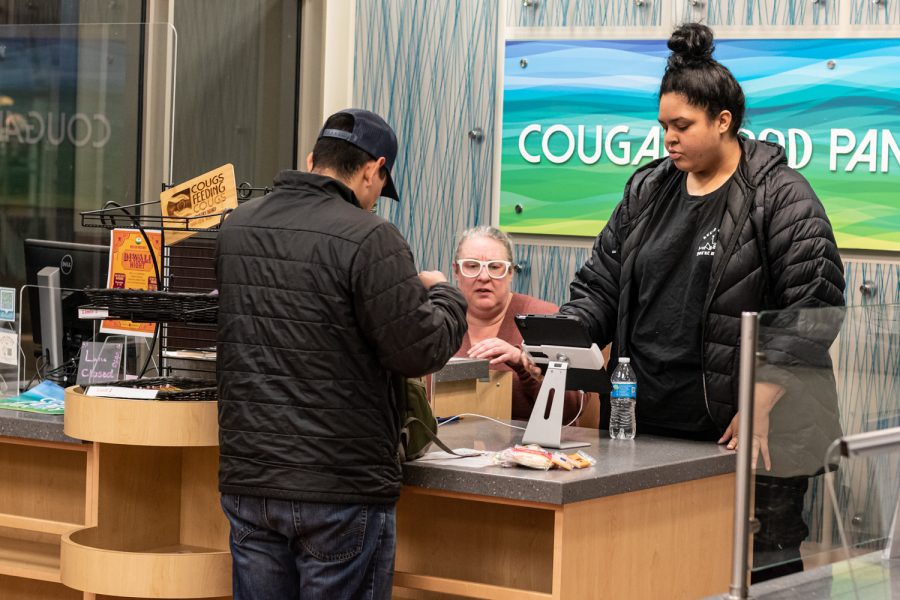GPSA approves increased funding for food pantry
A one time payment of $2,000 has been granted to the Cougar Food Pantry with talks of additional funding
Students shop in the Cougar Food Pantry in the CUB, Nov. 15.
November 16, 2022
The WSU Graduate and Professional Student Association approved a one-time payment of $2,000 to the Cougar Food Pantry at last week’s meeting on Monday.
GPSA President Sam Edgerton said she and a few other members of the GPSA formed a food security committee to research the issue and come up with a solution, as well as look into how to fund the food pantry.
“It’s an undergraduate problem as well but traditionally in the past graduate students as a political organization have not done a lot of service towards this initiative,” Edgerton said.
Up until this point, that food pantry has only been funded by undergraduate students. However, ASWSU implemented a $5 per semester student fee and that fee goes towards the CUB food pantry, Edgerton said.
The first thing GPSA has done to help the food pantry is approve a pre-reserved $2,000 per semester payment towards the food pantry out of the community affairs budget, which is meant to help them stock the pantry in the short term.
“For the long term, what we voted on was approved, similar to ASWSU, a $5 per semester fee that will specifically be targeted for the food pantry,” Edgerton said. “Graduate students need to understand that if we use it we have to find some way to pay for it, and this seems like the easiest way to do it.”
Edgerton said a major goal of this initiative is to have oversight of where the funds are being spent. GPSA will be working with the food pantry throughout the spring and summer to develop a means of oversight of the process.
“We want to make sure the fee taken from graduate students goes directly towards usage by graduate students,” she said.
Edgerton said in the future she would like for GPSA to find further means of funding the food pantry, as well as updating the university resources to help students suffering from food insecurity.
Ninh Khuu, senator of research and extension centers, said as part of the research into food insecurity, he volunteered at a few local food banks to understand the problem better. His biggest takeaway was that the food security net for students is very loose and disconnected.
Senator Madison Honig of the anthropology department said as part of her research, she noticed a lack of updates and current information online related to food insecurity. She also visited the food pantry and noticed there seemed to be a lack of availability of food there.
“We decided last week or two weeks ago just to kind of ask how it worked and what was available. Truthfully the shelves were quite empty and there was nothing really to make a dignified meal,” Honig said. “I noticed that there would be very few options to accommodate certain dietary restrictions.”
Honig said an important factor in the future would be to make sure the food pantry was putting the money towards stocking the shelves of the food pantry.
“I think the other thing that has been very frustrating for us to learn is that it is almost completely funded with student money,” she said. “There’s no investment from the university.”
Merri Lecoq, Cougar Food Pantry coordinator, said it takes about $4,000 a week to keep the shelves stocked with enough food. The biggest priority with the addition of funds is to make sure the shelves are stocked and to make sure there is enough food for all dietary restrictions.
About ⅓ of the visitors the food pantry receives are graduate students, Lecoq said. Graduate students also are usually using the food pantry more frequently because they sometimes have kids or other family members to support.
In the future, Lecoq said it would be helpful to receive funding from other places as well, such as any community or business partnerships that might be able to help out.
Lecoq said she recommends anyone who feels they need to to use the food pantry and there is no shame in doing so. She also thanked everyone who has provided help to fund the pantry thus far.
“I’m just really glad that everyone’s kind of buying into the pantry and realizing it is a very good resource,” she said. “I think that it’s a great thing that students want to help everyone and destigmatizing [using the food pantry] is a welcoming thing.”
Khuu said a good idea to help funding would be for the university to reach out to specific donors. He mentioned that WSU recently reallocated 2.5 million dollars to shore up the athletic department, so they have the funds to help the food pantry.
Honig said students can receive holiday foods from the Community Action Center at https://www.cacwhitman.org/foodbank/ . In addition, students can fill out Supplemental Nutritional Assistance Programs applications at the CAC.











